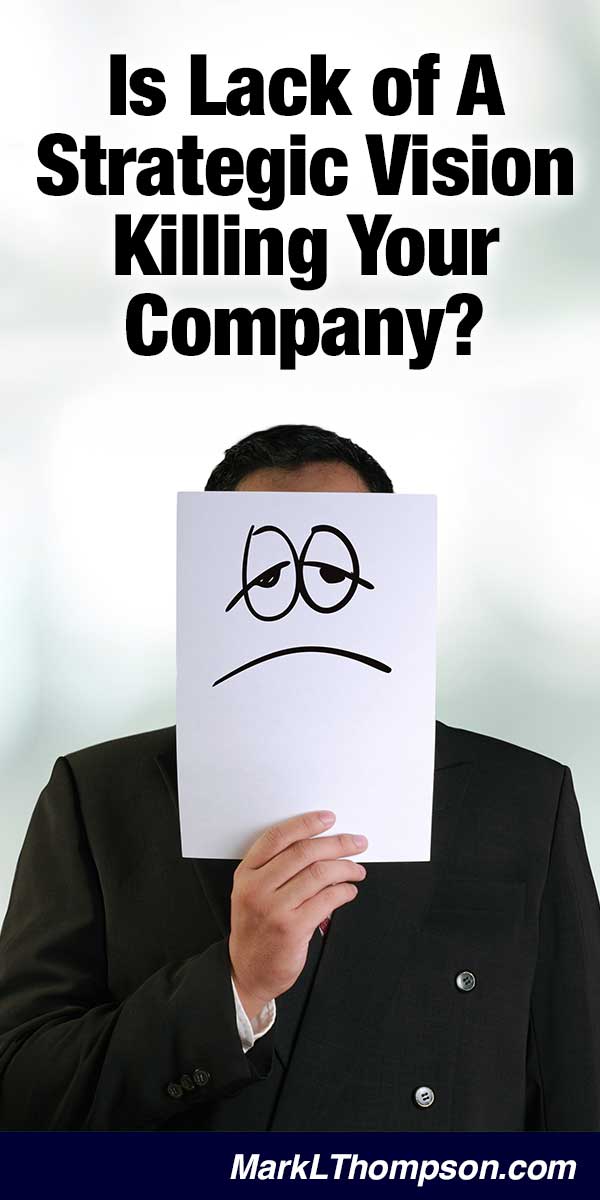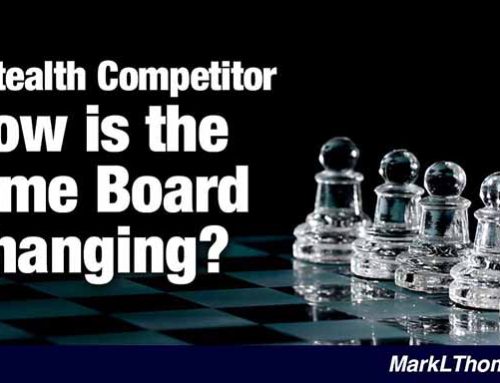Strategic Vision is about the future. How much time does your organization think about the future versus the day to day?
In every industry there is a revolution of sorts going on and defining how the future in that industry will play out. For example in the energy industry it is fracking, a process of drilling into shale rock. In the electronic payments space it is mobile payments, and in the weight reduction industry it about lifestyle and vitality in addition to calorie counting.
All strategy discussions must first start out with a vision that the CEO has for the organization. A strategy is the articulation of that vision.
Strategic Vision
People in your organization cannot implement what they cannot see or understand.
A vision serves several purposes in an organization. First and foremost, it captures the organization’s “future intent.” In other words, it paints a “picture” of what the company intends to become, not what it is today. A vision should stand the test of time and perpetuate the enterprise over long time-frames.
A vision can serve several purposes:
A vision bonds. Companies are populated with individuals possessing a diverse set of skills, languages, cultures, and personalities.
A vision inspires. Although all corporations measure their progress over time with numbers, growth, profits, or both, numbers generally don’t inspire ordinary people to do extraordinary things. But a more “noble” vision and strategy can inspire beyond anyone’s expectations.
A vision is an anchor. When times are difficult, a vision gives an organization an “anchor” that will steady the ship and hold everyone together until the storm passes.
A vision is a potent competitive tool. Having a sense of what one wants to become when grown up gives an organization an enormous competitive advantage over those who some say “do not have a clue.”
Do Your Employees Know the Organization’s Vision? What is Your Strategic Quotient?
Would it be interesting and are you curious to know the level of understanding people have about the vision and strategy of the organization? Seldom ever do you read about an organization that does well over extended periods of time without alignment or consensus of the people about the direction of the business. In fact with that alignment companies can do exceptionally better than their direct competitors.
If you are interested in assessing your organization’s strategic position, you may wish to answer the questions below and have your direct reports do the same. If all the answers are similar and each person’s view of the business is identical, then you are in good shape. The wider the discrepancies in their replies compared to yours, the less clear your strategy is, and you may wish to call for assistance.
1. Do you have a well-articulated, clear statement of strategy?
Yes (Score 10) | No (Score 1)
2. Could each member of your management team write a one-or- two sentence statement of that strategy without consulting each other?
All could (Score 10) | Some could (Score 5) | None could (Score 1)
3. Do you have your strategy in written form?
Yes (Score 10) | No (Score 5)
4. Do you and your management team use this statement as a guide for the choices you make together when deciding which future products, customers, and markets your company pursues?
Use frequently (Score 10) | Use sometimes (Score 5) | Never use (Score 1)
5. Do you use this statement as a guide to decide which products, customers and markets your company does not pursue?
Use frequently (Score 10) | Use sometimes (Score 5) | Never use (Score 1)
6. Do you use this statement as a tool to decide how resources are allocated within your company?
Use frequently (Score 10) | Use sometimes (Score 5) | Never use (Score 1)
7. Do you use this statement as a tool to choose which opportunities your company pursues and which ones it doesn’t?
Use frequently (Score 10) | Use sometimes (Score 3) | Never use (Score 1)
8. Have you ever sat down as a management team to try to obtain consensus as to the future direction of the organization?
Use frequently (Score 10) | Use sometimes (Score 5) | Never use (Score 1)
9. Was consensus obtained or are there still different visions of what the organization is trying to become?
One vision (Score 10) | Several visions (Score 5) | No vision (Score 1)
10. Do you have a separate process of strategic thinking to determine what you want to become as opposed to how you get there?
Formal, codified process (Score 10) | No process (Score 1)
TOTAL STRATEGIC VISION SCORE
Scoring Your Strategic I.Q.
If you wish to get a numerical assessment of your Strategic Quotient, simply add up the scores next to each question you responded to. The following is our assessment of your score:
Score: 100
You’re perfect. There is no need for you to read the remainder of this post unless you don’t know why you are so good.
Score: 70-99
There is some degree of ambiguity of strategy among the management team with periodic disagreements over direction, particularly on significant issues. You are on the cusp of great success if this ambiguity can be removed. Your batting average is a few more wins than losses but this average could be substantially improved by the removal of this ambiguity. Exposure to a good strategic process would bring considerable value.
Score: 40-69
You are suffering from a severe case of “fuzzy” vision. There are very differing views over strategic direction among the management team, which results in erratic operational performance. There are frequent disagreements over strategic issues and you are probably frequently surprised by competitive tactics. Failure to clear up this ambiguity will eventually lead to even worse operational results. Time to bring a process into play to relieve this organization of this ambiguity and stop the bickering.
Score: 1-39
A score in this range indicates too much focus on operational issues and short-term results.
Decisions are made on an event-by- event basis as opposed to being made within a set of strategic parameters. There is little agreement among the management team over direction with continuous and heated debates. As a result, decisions are frequently arbitrated and dictated by the CEO in order to break the stalemate. The company is in a me-too strategy whereby it is frequently surprised by competitive tactics and most actions are taken as a reaction to competitive initiatives. It is time for a re-think.
Next Steps
If this quiz has exposed some gaps in your company’s Strategic Vision, please do not hesitate to contact us for a complimentary Executive Overview Session to explore how we could help your business develop strategically.
Mark L. Thompson has been a Senior Partner with Decision Processes International for 20 years.
Mark can be reached at [email protected] or at 941-373- 6520.



